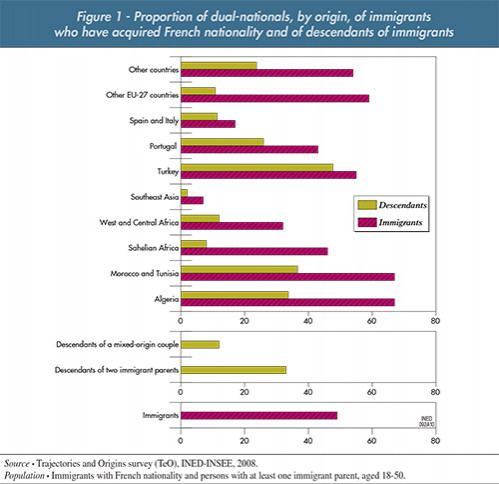Dual nationality and national identity

French law permits dual nationality and does not require foreigners who obtain French nationality to give up their original one. A naturalized immigrant can therefore legally have French nationality and the nationality of another country. (The converse is also true: French citizens may keep their nationality after opting to acquire a foreign one.) The same holds for descendants of foreigners born in France: they automatically become French when they come of age, but can choose at the same moment to maintain their original nationality.
The census shows that over 40% of immigrants living in France have acquired French citizenship and 95% of descendants of immigrants born in France are also French, but not much is known about dual nationality situations, which are not recorded by the census. Foreign consulates are the only source of information on the subject and that information may not be very reliable. One of the many contributions of the "Trajectories and Origins" survey is to provide a detailed account of dual citizenship situations. Examining French bi-national respondents’ answers to questions on feelings of national belonging enables us to answer another simple, if highly controversial, question: Do people with dual nationality feel torn between two allegiances ?
Dual nationality varies by origin
Dual nationals account for 5% of the population of metropolitan France aged 18 to 50 years; 90% of them are immigrants or descendants of immigrants. Nearly half of immigrants who have acquired French nationality have also kept their original one. While there are very few bi-nationals among persons originally from Southeast Asia (less than 10%), more than two-thirds of North African immigrants, 55% of Turkish immigrants and 43% of Portuguese immigrants combine French nationality with that of their countries of origin. Unlike Spanish or Italian immigrants, those from other EU27 countries mainly hold on to their original nationalities when they become French.
Likewise, immigrants’ descendants remain attached to their parent(s)’(s) original nationality. Nearly a third of adult children born to two immigrant parents report dual nationality. The figure falls to 12% for descendants of mixed parentage. Children of immigrants from Turkey have the strongest attachment to the nationality their parents transmitted to them; however, a third of descendants of Algerians, Moroccans and Tunisians also keep their parents’ original nationality. This has particular significance for children of Algerians: since jus soli (being born in France to at least one parent born in France - see Article 23 of the Code de la Nationalité, and Article 19-3 of the Code Civil) obtains in both countries, they have been French since birth. Meanwhile, very few descendants of Southeast Asian immigrants have dual citizenship, and it is also quite rare among individuals whose parents originally came from Italy or Spain.

Dual nationality and dual allegiance
Being a dual national has little impact on feeling French. Bi-national immigrants feel just as French as those who gave up their original nationality: 82% in both cases. The feeling of national (French) belonging among bi-national children of immigrants is slightly weaker (87%) than among immigrants’ children with only French citizenship (94%). However, dual nationality is significantly associated with stronger feelings of belonging to the country of origin (one’s own or one’s parents’). In other words, having dual citizenship is a sign of attachment to origins, but this is not contradictory with having a strong French identity. It is important today to recognize and respect identity plurality rather than conceiving of identity in the singular and assuming that it involves an exclusive allegiance.
Source: Patrick Simon, «Nationality and National Sentiment» in Cris Beauchemin, Christelle Hamel et Patrick Simon (Coord.), Trajectories and Origines. Survey on Population Diversity in France. Initial Findings, Documents de travail n°168, Ined, 2010
Contact: Patrick Simon
Online: February 2012
